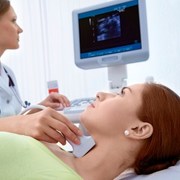New mothers struggling with roller coaster emotions or unrelenting sadness, waves of incapacitating fatigue or anxiety, take notice. Your symptoms may not simply be due to lack of sleep or the many stresses and new challenges of motherhood. An imbalance in your thyroid could be the culprit, a not so rare condition called postpartum thyroiditis.
“Until the last two decades, there has been little information available about postpartum thyroiditis. However, recent research has demonstrated the need to recognize and, if necessary to treat women suffering from this disorder,” according Thyroid Australia Ltd, a website dedicated to providing support to patients with thyroid conditions.
Postpartum thyroiditis is a non-painful inflammation of the thyroid gland that occurs in up to 15% of women four to six months after delivery of their baby. The cause is unknown, but it is linked to a misguided immune response triggered during pregnancy that attacks the cells of the mother’s thyroid.
The inflamed thyroid first responds by over compensating, leading to excess production of thyroid hormones in the blood (hyperthyroidism). Over time as the thyroid is affected further, activity is reduced and low levels of thyroid hormones (hypothyroidism) can linger for many months in some women.
The two opposing phases of postpartum thyroiditis have contrasting symptoms. An over active thyroid speeds up a woman’s metabolism to the point where she may lose weight very quickly; some women report a loss of ten to twenty pounds in just a few weeks. This may be accompanied by additional hyperthyroid symptoms including rapid pulse, racing heart rate, anxiety, difficulty sleeping, hot flashes, shaking hands (tremors) and diarrhea.
During hypothyroidism, metabolism slows leading to the inability to lose weight even when eating carefully and exercising. Other typical symptoms of an under active thyroid may include extreme fatigue despite long hours of sleep or rest, unexplained prolonged depression, hair loss, dry or brittle skin and nails and constipation.
Symptoms of postpartum thyroiditis sometimes resolve on their own after a few months, but for some women long-term thyroid problems can develop that require ongoing treatment and careful monitoring by a physician.
It’s important for a new mother to determine if she has postpartum thyroiditis because it is easily passed off as normal fatigue or the “baby blues” after delivery. The condition is easily detected by simple blood tests and can be treated with temporary thyroid hormone replacement therapy or other medications depending on the symptoms.
Women who have had one episode of postpartum thyroiditis need to know that they have an increased a risk of developing a future thyroid problem during times of stress, following another pregnancy or during perimenopause/menopause. Researchers at Oklahoma State University recently found that the hormone imbalances of postpartum thyroiditis may also have a direct association with postpartum depression of new mothers.
The authors acknowledge their results stem from a small pilot study, but they suggest that further investigation is warranted. “Postpartum depression can have consequences for neonates—such as alienation, indifference, detachment with lack of love, and resentment—awareness and treatment of its various etiologies, including thyroid dysfunction, are worthwhile endeavors for future research,” they conclude.
Article Links:
Shoman, M. 2009. “Postpartum depression and Postpartum Thyroid Disease, “ About.com article: http://thyroid.about.com/od/hormonepregnantmenopause1/a/postpartum.htm
Thyroid Australia Ltd., 2001. “Postpartum Thyroidits” overview and description.
http://organizedwisdom.com/helpbar/index.html?return=http://organizedwisdom.com/Postpartum_Thyroiditis&url=www.thyroid.org.au/ThySoc/ThySocPPTD.html
McCoy, S.J., et al., 2008. “Postpartum thyroid measures and depressive symptomology: a pilot study,” Journal of Am Osteopathic Assn: http://www.jaoa.org/cgi/content/full/108/9/503
Related Links:
Brigham and women’s Hospital, 2008. Background on Postpartum thyroiditis
http://brighamandwomens.staywellsolutionsonline.com/Library/Encyclopedia/85,P00425




